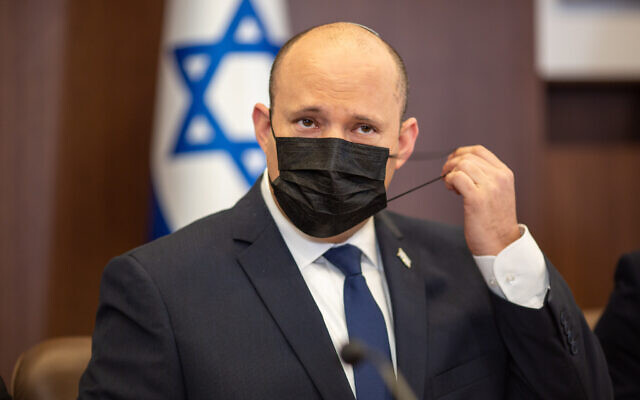- Ministers expected to authorize the decision later Sunday, with countries to be designated ‘red’ starting Wednesday
- This week, Israel placed UK, Denmark, France, Spain, the United Arab Emirates, Ireland, Norway, Finland, and Sweden on “red” no fly list
The Health Ministry on Sunday recommended that the government add 10 new countries to the list of destinations designated “red” due to high COVID-19 infections rates, as Israel braces for a wave of new cases driven by the Omicron variant.
Ministers were expected to approve the recommendation to bar travel to the United States, Italy, Germany, Belgium, Hungary, Canada, Morocco, Portugal, Switzerland and Turkey from Wednesday, December 22, in a meeting of the coronavirus cabinet later Sunday.
The decision is driven by data seen by Prime Minister Naftali Bennett showing the likelihood of “a significant outbreak” of COVID-19 within three weeks, with the peak surpassing that of the Delta wave, which started in June.
Channel 12 reported Saturday that Bennett is “looking to buy time” to possibly delay the wave of infections by “closing the skies” to destinations popular with Israelis.
Israel has already added nine countries to the “red,” no-fly list this week: the UK, Denmark, France, Spain, the United Arab Emirates, Ireland, Norway, Finland, and Sweden.
Those wanting to travel to “red” countries need to first obtain special permission from a government committee.
Israelis who return from those countries are required to enter quarantine in state-run hotels until their first COVID test comes back negative, after which they can leave, but must remain in home quarantine for seven days, even if they are fully vaccinated.
On Thursday, the cabinet voted to extend the current travel restrictions, including the ban on foreigners entering the country and a requirement for all returning Israelis to quarantine for three days upon entry. The limitations will now last until December 29 at least.
Health Minister Nitzan Horowitz said Sunday that the restrictions were needed to “buy time” for the vaccination campaign.
“We are facing a new situation. Most of the infection from Omicron is coming from abroad, so we must limit the rate of entry of the virus into Israel in order to buy time and vaccinate as much as possible before the spread also occurs in Israel,” Horowitz told Army Radio.
Bennett has come under criticism in recent weeks for the policy steps he has taken; however, according to the Haaretz daily, the premier believes he has bought the time needed to slow the entry of the highly contagious variant into the country, giving scientists a window to study it as well as buying time for the vaccination and booster campaign.
Bennett is expected to focus on the vaccination of children, some one million of whom remain unvaccinated.
The Health Ministry said Sunday that 372 new COVID-19 infections were diagnosed on Saturday, a low number reflecting reduced testing over the weekend. Some 838 new COVID-19 cases were diagnosed Thursday, 45 of which had been confirmed to be of the Omicron variant, bringing the total number of Omicron cases in Israel to over 130. Health care workers test Israelis in a drive-through coronavirus testing complex in Jerusalem, on December 10, 2021. (Olivier Fitoussi/Flash90)
Most of the cases were found in people returning from overseas. The ministry did not provide a breakdown of the latest figures.
According to the ministry, there were 81 COVID-19 patients in serious condition and 41 on ventilators Sunday. Most patients in serious condition are over 60 and unvaccinated.
Since the start of the pandemic, 5.8 million Israelis have received two vaccine doses, and over 4.1 million have gotten a third, booster shot.
The death toll in Israel since the start of the pandemic stood at 8,232 on Sunday.
First published in Times of Israel, https://www.timesofisrael.com/us-canada-germany-italy-among-10-countries-israel-set-to-add-to-no-fly-list/?utm_source=Push&utm_medium=Firefox&utm_content=Breaking_News&utm_campaign=desktop-notifications

